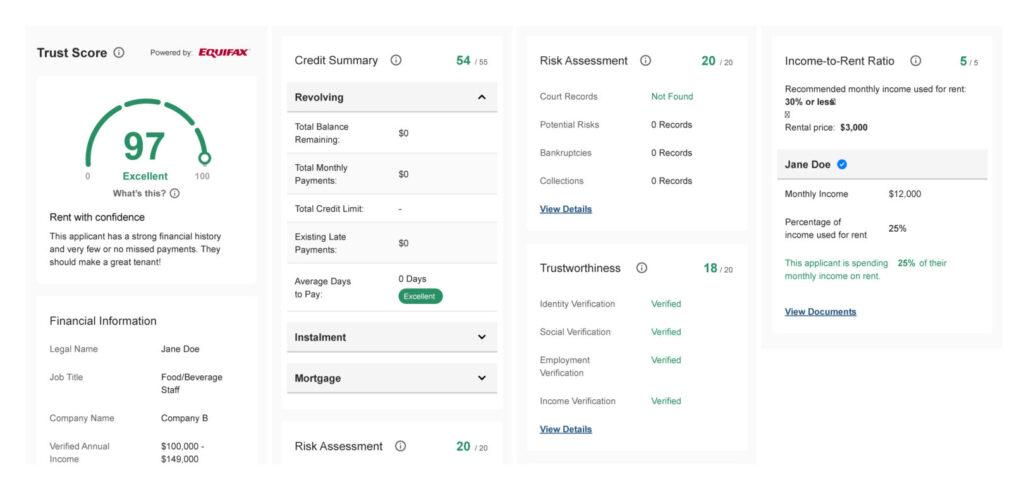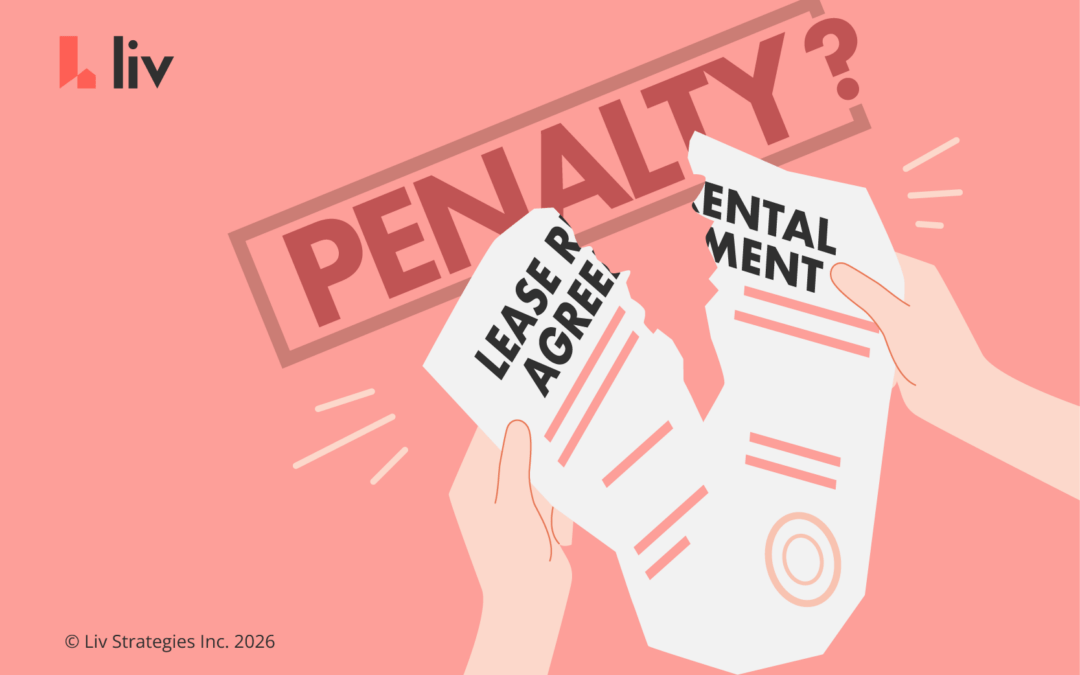Despite landlords’ best efforts, sometimes troublesome tenants are an unfortunate reality of renting. Obviously, the best way to avoid dealing with bad tenants is to avoid the situation altogether, but sometimes issues don’t arise until a lease is signed. Bad tenants can cause expensive damage to your property, disturb neighbours, and cost you thousands of dollars. In the most extreme cases, a ‘professional tenant’ might avoid paying rent for six months or more. To help you deal with these incredibly stressful situations, liv.rent has compiled this guide with tips and resources for removing bad tenants from your rental property safely and in accordance with the applicable residential tenancy guidelines.
Find the right renters faster with the Trust Score
Unlock an easier, more effective way to screen renters. The Trust Score from liv.rent combines credit information from Equifax®️, income & employment verification, court records, and more into one easy-to-understand score. Click here to view an example of the Trust Score.
How bad tenants can impact your rental property
Bad tenants can quickly turn a landlord’s passive income stream into a waking nightmare. Even if you manage to evict unsavoury renters promptly, they’re likely to leave behind a wake of trouble that can cause financial and emotional damage long beyond the end of their tenancy. Let’s take a quick look at some of the ways bad or professional tenants can impact landlords:
- Unpaid rent
- Damage to your property
- Eviction costs (court, bailiff, etc.)
- Cost of an attorney/other legal help
- Countless hours of stress
It goes without saying that landlords are better off avoiding these things, which is why having a rock-solid tenant screening process in place is so important.
Download The Ultimate Tenant Screening Guide
In order to pick the right tenant, you need to ask the right questions. Download the ultimate tenant screening guide, which contains 56 questions you can ask potential tenants at every stage from initial contact and application to showing and signing.
How do you spot a bad or professional tenant?
To avoid ever dealing with bad tenants, it’s important to establish and closely follow a robust tenant screening process. The best way to protect yourself against problematic renters is to ask the right questions, and ask lots of them. The worst tenants can often appear as the perfect candidate, presenting themselves well and turning on the charm when needed in hopes that the landlord will let their guard down and skip on doing their due diligence. To avoid problems later on, it’s vital to be thorough when screening applicants.
To this end, we always recommend that landlords go beyond credit checks when deciding on a suitable renter. While financial information is hugely important to make sure that tenants can afford rent, it doesn’t tell the whole story of their reliability and trustworthiness.
That’s why liv.rent created the Trust Score: our comprehensive tenant screening report. Compiling Equifax® credit information, income & employment verification documents, a detailed risk assessment, and more into a single report, this convenient tool is your best defence against bad tenants. Landlords can unlock the score to view a concise score out of 100, plus detailed information about tenants’ financial and rental history.
Better yet, we help landlords avoid fake or duplicitous tenants altogether by manually verifying both identity documents and income statements to confirm a match. Below, you can view a sample Trust Score report.

>> Recommended Reading: The Trust Score: Explained For Landlords And Renters
How to get rid of bad tenants
Evicting a tenant shouldn’t be taken lightly, but sometimes the situation calls for it. If you suspect or have evidence that a professional tenant has taken up residence in your property, it’s time to take action. Let’s look at when and how landlords can evict tenants.
When can you evict tenants?
When negotiations fail and problems keep arising, landlords may have to turn to the eviction process to remove bad tenants from their rental properties. While this is obviously a last resort, it’s usually the only way to get rid of troublesome tenants and resolve the situation.
Eviction laws vary by province, so be sure to consult the below guidelines for information on how to evict tenants in your area.
Reasons to evict tenants in BC
- Missed rent or utility payment (10-day notice) — Regardless of whether they are short the full amount or a single dollar, you can issue a 10-day Eviction Notice for any missed rent or utility payment. If the tenant doesn’t challenge within five days of receiving notice, they will be expected to move out by the tenth day.
- Disturbance, damage, illegal activity, etc. (30-day notice) — For most other reasons, including breaching a serious term of your lease and ignoring warnings, too many occupants in the unit, causing danger to yourself or other occupants, and multiple late rent payments, a 30-day notice to end tenancy is the standard. The tenant must then dispute this notice within 10 days of receiving it. A complete list of reasons for evictions can be found in Section 47 of the Residential Tenancy Act (RTA).
- Landlord’s use of property (2-month notice) — If your home has been sold or you or a close family member wishes to occupy the unit, you must issue a two month notice to end tenancy.
- Major renovations/Demolition (4-month notice) — For any major renovations including demolishing the property, landlords must issue their tenant a four-month notice.
>> Recommended Reading: Landlord Guide: How To Evict A Tenant
Reasons to evict Tenants in Ontario
Ontario has a number of additional types of notices required for terminating a tenancy. Let’s take a look at some of the most important for getting rid of bad tenants:
- N4 – Notice to End a Tenancy Early for Non-payment of Rent — This cannot take effect less than 14 days after the notice was issued for yearly or month-to-month leases, and tenants still have this period to pay any missing rent. After this, the landlord must apply to the Landlord and Tenant Board for an eviction notice.
- N5 – Notice to End Tenancy for Interfering with Others, Damage, or Overcrowding — The tenant still has seven days to correct their behaviour, at which point the landlord can apply for an eviction notice. The termination date must be at least 20 days from when the notice was issued if this was the first such offense.
- N6 – Notice to Terminate a Tenancy Early: Illegal Act or Misrepresentation of Income — If a tenant is believed to be falsifying their income for the sake of receiving subsidized housing, etc., then a landlord may file for this notice.
- N7 – Notice to End your Tenancy For Causing Serious Problems in the Rental Unit or Residential Complex — This one’s pretty self-explanatory. A landlord may seek an eviction notice from the board one day after the termination date specified in the written notice.
How can I evict a tenant
The eviction process can vary depending on what province you’re renting in. Here, we’ll break down the step-by-step actions you’ll need to take in both BC and Ontario to give landlords an overview of what eviction might look like for them. Remember that regardless of the severity, landlords can’t carry out evictions on their own. Don’t change any locks, shut off utilities, or prevent the tenant access to the property by other means or you risk going to jail. For more even more detailed information on how to evict tenants, refer to our article here.
How to evict a tenant in BC
- Serve the tenant with a copy of a Residential Tenancy Branch (RTB) Order of Possession.
- Take the Order of Possession to the BC Supreme Court and obtain a Writ of Possession.
- Use the Writ of Possession to hire a court-approved bailiff.
- Overholding: If tenant stays past the move-out date listed on an eviction notice or Order of Possession, you will be owed additional rent money. If you hire a court-approved bailiff to remove tenant and their belongings from the rental unit, tenant can be held responsible for at least some of the associated costs.
- Role of the police: The police do not have the authority to evict tenants on their own. However, a court-approved bailiff may ask them to attend an eviction to keep the peace while a tenant is being removed.
How to evict a tenant in Ontario
- Give the tenant a written notice stating that you want them to move out. You must use the official notice granted by the Landlord and Tenant Board.
- If the tenant doesn’t fix their behaviour or move out, file an application to the Board to end the tenancy. This application must be made within 30 days of the termination date specified in the official notice.
- The Board will schedule a hearing to rule on your application. Both landlord and tenant will receive a Notice of Hearing along with a copy of the application.
- A Board member will decide whether or not the tenant should be evicted and both landlord and tenant will be notified of their decision in writing.
- If the tenant remains on the property past the termination date, the landlord must file a copy of the Board order with the Sheriff’s office to have the order enforced and the tenant removed from the property. You cannot remove the tenant or their belongings on their own.
Other ways to get rid of bad tenants
While you should always follow the aforementioned procedures to evict a tenant, the most stubborn renters can sometimes warrant a more creative approach. There are plenty of ways to send bad tenants packing if they’re causing trouble and refuse to play by the rules. Let’s look at a few:
- Plan a major renovation — If your property already needs a substantial upgrade, this is the time to do it. Though you need to give the proper notice and keep things above board, most tenants won’t bother to dispute a significant renovation.
- Provide evidence of illegal activity — Be sure to document any evidence you have of illegal activity on your property to ensure you have a solid case.
- Exchange cash for keys — If it really comes down to it, you may need to offer your tenant cash in exchange for their signing a Mutual Agreement To End Tenancy. This method is particularly effective with professional tenants, and can still save you money as opposed to hiring lawyers and carrying on a months long dispute.
- Raise the rent — Unfortunately, this won’t be as effective in provinces that have a maximum allowable rent increase, but even then it can be enough to deter tenants from renewing their lease when it comes time.

Rethink The Way You Rent
Not on liv.rent yet? Experience the ease of digital applications & contracts, verified tenants & landlords, virtual tours and more – all on one platform. Sign up for free or download the app.
Subscribe to receive the latest tenant & landlord tips and get notified about changes in the Canadian rental market.
>> Stay up-to-date on the average rent in Vancouver, Toronto and Montreal: Rent Reports.



0 Comments